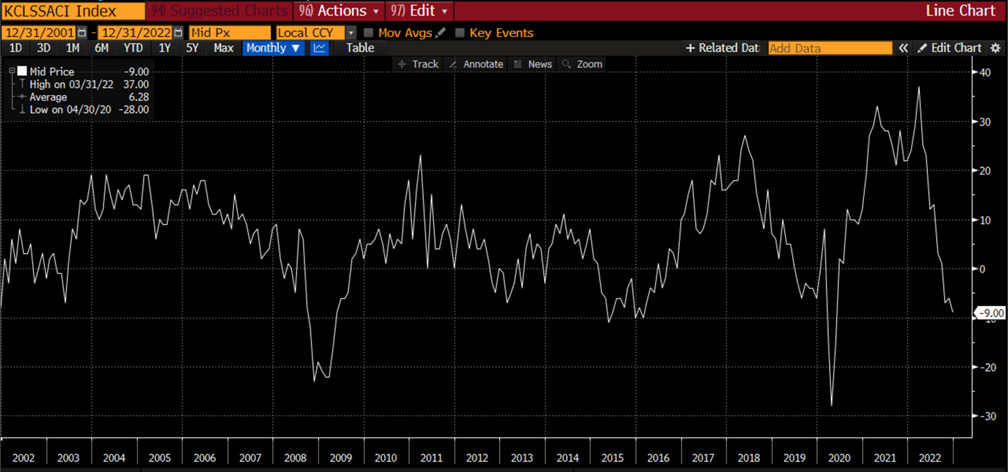Regional Fed Surveys — Week of January 23, 2023

Essential Economics
— Mark Frears
Same or different
I have had the opportunity to live in many regions around the country. Growing up in the cold Midwest in Michigan, college in the Pacific Northwest, significant time in Texas, and a short stint in the Central Atlantic. All the areas have their plusses and minuses, depending on the time of year, activity or job prospects. The Federal Reserve Banks around the country administer monthly surveys to see how their districts are faring. What do these tell us about the overall economic health?
Texas
The latest Dallas Fed’s Manufacturing Survey, released December 28, 2022, showed growth resuming but demand continuing to decline. Signals continue to be mixed with new orders’ continued fall reflecting weaker demand, but capacity utilization and shipments improved.
The broader economic outlook continues to dim, but employment is picking up with stronger overall numbers and a longer workweek. Twenty-four percent reported net hiring while only ten percent reported net layoffs.
Prices and wages have stabilized, and the future manufacturing activity is positive. Overall a mixed bag, and continued decreased demand is not a good signal.
Fifth district
Richmond Fed released their survey covering the Richmond, Baltimore and Charlotte areas on December 28. Their composite manufacturing index moved into positive territory. All three components, shipments, new orders and employment, improved with shipments moving from -8 to +5 in December.
The wage index increased markedly, reflecting a continuing tight labor market. The local business conditions index remained unchanged, but more firms foresee worse conditions over the next six months.
Empire State
The January survey for New York state showed significant contraction with the headline index falling 22 points to -32.9. This is the lowest reading since mid-2020 and the fifth lowest in recorded history.
New orders and shipments fell, while delivery times stabilized and inventories increased. Inventories are a key indicator as they can show slowing demand, leading to further weakening conditions. Employment declined, workweek shortened, yet lower overall prices are one bright spot.
As you can see below, looking ahead six months does not improve the outlook.

Source: Empire State Manufacturing survey
Philly
While their football team continues to roll, the same cannot be said for the manufacturing sector. The January index did improve but remains in negative territory. This is the fifth consecutive negative reading and seventh in the last eight months.
While new orders and shipments rose last month, they are still in negative territory. Firms reported employment and prices are higher. They do expect prices to moderate over the next six months.
Looking to the future, there has been slight improvement, but it is still below long-term trends.
Midwest
The Chicago Fed Manufacturing Index covers the Seventh Fed District. The Index continued to fall in November, decreasing from -33 to -38, well below the 10-year average of +6.
Outlook, hiring, activity and costs are all well below zero.
Tenth district
The Kansas City Fed’s Manufacturing Survey also covers the major cities of Denver, Oklahoma City and Omaha. This regional index decreased at a faster pace in December than the previous month. The reading was -9, down from -6 in November and -7 in October.
The components of this index are production, new orders, employment, supplier delivery time and raw materials inventory. Primary drivers of the lower index were decreased activity in printing, wood products, machinery manufacturing and food manufacturing.
As you can see below, this index is not down to the lows of the Great Recession or pandemic, but the trend is not improving.

Source: Bloomberg
The outlook for the KC index improved slightly last month, moving from 0 to +2.
Consumer focus
In addition to the gloomy news from the factory side, consumer Retail Sales for December were also released this past week. The month-over-month number came in at -1.1%, down from -0.6% last month.
It appears the Fed’s monetary tightening has begun to work its way through to the consumer. I would not say they are done yet, as increasing wages, with falling goods prices, will keep the consumer in play.
Wrap-up
While forecasts for fourth-quarter Gross Domestic Product are still firmly positive, the weight of higher rates and a gloomy factory outlook should push the U.S. into recession at some point this year. Different regions, in their diversity, will feel the impact of this in varying degrees.
| Upcoming Economic Releases: | Period | Expected | Previous | |
|---|---|---|---|---|
| 23-Jan | Leading Index | Dec | -0.7% | -1.0% |
| 24-Jan | Philadelphia Fed Non-Manuf Activity | Jan | N/A | (17.1) |
| 24-Jan | S&P Global US Manufacturing PMI | Jan | 46.0 | 46.2 |
| 24-Jan | S&P Global US Services PMI | Jan | 45.0 | 44.7 |
| 24-Jan | S&P Global US Composite PMI | Jan | 47.0 | 45.0 |
| 24-Jan | Richmond Fed Manufacturing Index | Jan | (5) | 1 |
| 24-Jan | Richmond Fed Business Conditions | Jan | N/A | (14) |
| 26-Jan | Chicago Fed Nat Activity Index | Dec | N/A | (0.5) |
| 26-Jan | GDP Annualized QoQ | Q4 | 2.7% | 3.2% |
| 26-Jan | Personal Consumption | Q4 | 2.8% | 2.3% |
| 26-Jan | GDP Price Index | Q4 | 3.2% | 4.4% |
| 26-Jan | Wholesale Inventories MoM | Dec | 0.5% | 1.0% |
| 26-Jan | Retail Inventories MoM | Dec | 0.2% | 0.1% |
| 26-Jan | Initial Jobless Claims | 21-Jan | 205,000 | 190,000 |
| 26-Jan | Continuing Claims | 14-Jan | 1,657,000 | 1,647,000 |
| 26-Jan | Durable Goods Orders | Dec | 2.5% | -2.1% |
| 26-Jan | Durables ex Transportation | Dec | -0.2% | 0.1% |
| 26-Jan | Cap Gds Orders non def ex air | Dec | -0.2% | 0.1% |
| 26-Jan | New Home Sales | Dec | 610,000 | 640,000 |
| 26-Jan | New Home Sales MoM | Dec | -4.7% | 5.8% |
| 26-Jan | KC Fed Manufacturing Activity | Jan | (8) | (9) |
| 27-Jan | Personal Income | Dec | 0.2% | 0.4% |
| 27-Jan | Personal Spending | Dec | -0.1% | 0.1% |
| 27-Jan | Real Personal Spending | Dec | -0.1% | 0.0% |
| 27-Jan | PCE Deflator YoY | Dec | 5.0% | 5.5% |
| 27-Jan | PCE Core Deflator YoY | Dec | 4.4% | 4.7% |
| 27-Jan | Pending Home Sales MoM | Dec | -1.0% | -4.0% |
| 27-Jan | UM (Go State) Consumer Sentiment | Jan | 64.6 | 64.6 |
| 27-Jan | UM (Go State) Current Conditions | Jan | N/A | 68.6 |
| 27-Jan | UM (Go State) Expectations | Jan | N/A | 62.0 |
| 27-Jan | UM (Go State) 1-yr inflation | Jan | 4.0% | 4.0% |
| 27-Jan | UM (Go State) 5- to 10-yr inflation | Jan | 3.0% | 3.0% |
| 27-Jan | KC Fed Services Activity | Jan | N/A | (5) |
Mark Frears is an Investment Advisor, Executive Vice President, at Texas Capital Bank Private Wealth Advisors. He holds a Bachelor of Science from The University of Washington, and an MBA from University of Texas – Dallas.
The contents of this article are subject to the terms and conditions available here.